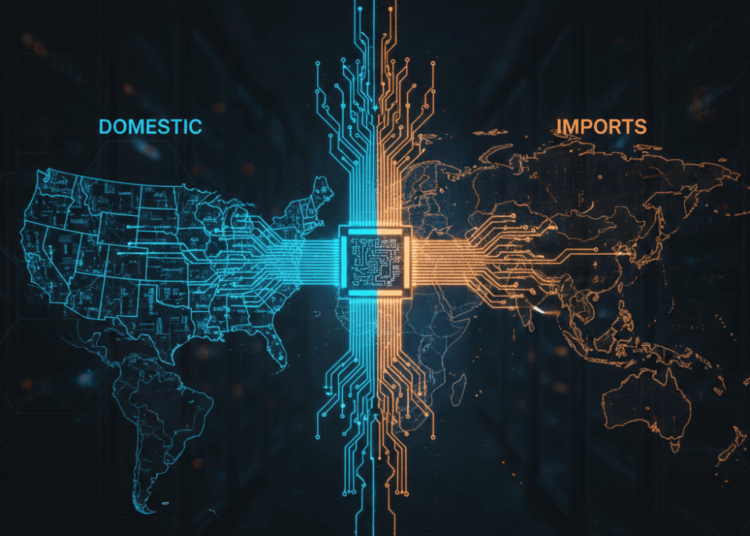In a striking move aimed at reshaping global supply chains and bolstering national security, the U.S. government is reportedly preparing a new rule that would compel semiconductor companies to match their domestic manufacturing output with the volume of chips imported. Under the proposed 1:1 chip mandate, companies that fail to maintain parity over time may be penalized via steep tariffs.
Background & Rationale
According to people familiar with the plan, the policy would require chipmakers to produce in the U.S. the same quantity of semiconductors that their customers import from foreign manufacturers. The rationale behind the move appears twofold: reducing dependence on foreign supply chains (especially in East Asia) and reinforcing economic and technological sovereignty.
Last month, President Donald Trump floated a 100 % tariff on semiconductor imports, but signaled that companies already manufacturing domestically—or committed to doing so—would be exempt. Commerce Secretary Howard Lutnick has reportedly discussed the new approach with key semiconductor executives, suggesting it may be necessary for “economic security.”
Yet, the policy is far from settled. The White House and Commerce Department have not publicly confirmed or denied the plan.
How It Would Work: Compliance & Enforcement
Under the proposed regime, firms would be required to track their import volumes and domestic production over a given assessment period. If they fall short of a 1:1 ratio, tariffs could be levied as compensation.
Critics and industry insiders warn that implementing such a policy would present serious challenges. Semiconductor supply chains are notoriously complex, involving design, wafer fabrication, testing, packaging, and logistics—often spread across multiple countries. Matching imported chips with the same domestic variants may prove infeasible, especially for specialty nodes or niche designs.
Furthermore, scaling domestic production to match import levels would require massive capital investment, infrastructure build-out, and workforce development—factors that could take years to materialize.
Industry & Global Reaction
While the policy is still in its conceptual stage, it has already drawn attention from industry players and foreign governments. Some chipmakers may view the rule as coercive, challenging both their conventional global sourcing strategies and cost-optimizing models. Others might see opportunity in gaining favored status via exemptions or incentives.
International partners—especially those heavily integrated into semiconductor ecosystems like Taiwan, South Korea, and Japan—may see the mandate as protectionist or disruptive. It could provoke retaliatory measures or trade tensions.
Still, the U.S. has already tipped its hand with massive subsidies and incentives under the CHIPS Act, aimed at accelerating domestic production. The 1:1 chip mandate, if enacted, would represent a further escalation of U.S. efforts to localize chip supply chains at scale.
Risks, Tradeoffs & Uncertainties
-
Feasibility concerns: Some chip types (advanced nodes or specialized components) may not have ready domestic equivalents.
-
Cost burden: U.S.-based manufacturing is often more expensive—raising costs for firms and potentially for end consumers.
-
Supply disruptions: Integrating new domestic capacity may displace proven overseas suppliers prematurely, risking shortages or quality issues.
-
Trade friction: The mandate could draw objections under WTO rules or lead to countermeasures from trade partners.
-
Regulatory complexity: Monitoring, auditing, and enforcing compliance across diverse firms would demand sophisticated oversight.
Outlook & Next Steps
At present, the 1:1 chip mandate remains a proposal floated in executive discussions and industry briefings. No formal rule has been published, and significant policy, technical, and logistical hurdles must be addressed. Still, the signal is clear: the U.S. is intensifying pressure on semiconductor firms to reorient their operations domestically.
For chipmakers, the coming months will be critical. They will need to engage with regulators to shape feasible guardrails, evaluate capital investments, and potentially restructure supply chains. Governments and global semiconductor hubs will closely monitor the proposal’s evolution—and gauge whether it can survive legal, economic, and geopolitical scrutiny.
In short: the U.S. is considering an aggressive rewrite of semiconductor sourcing norms—with far-reaching implications for the tech industry and global trade.
For deeper analysis and strategic insights from a top business magazine, check out IMPAAKT for informed coverage on tech policy and global industry trends.















